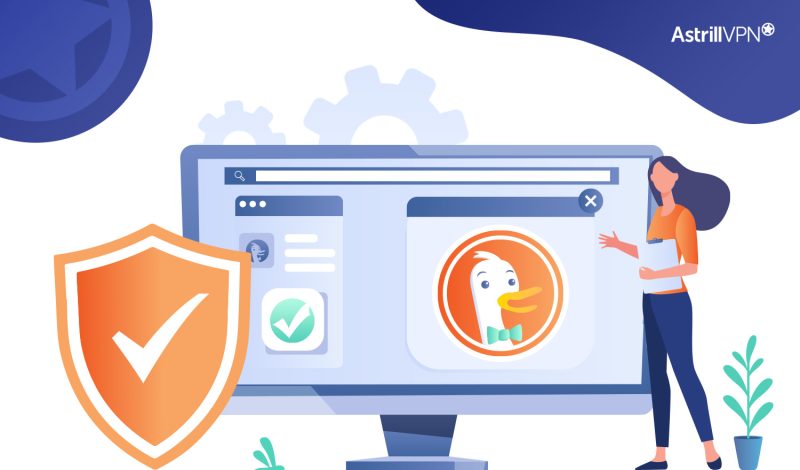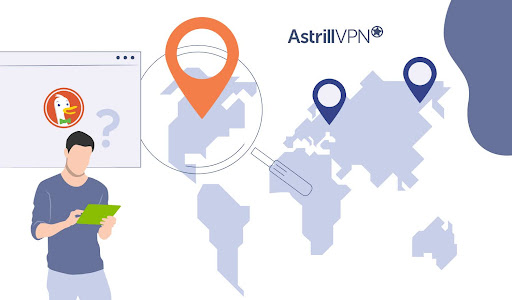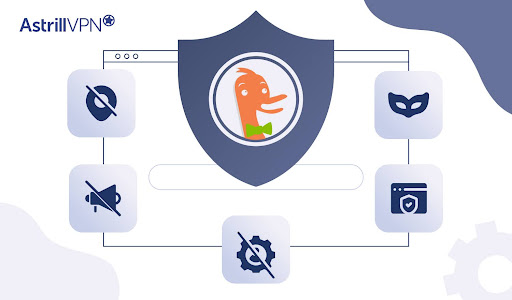Is DuckDuckGo safe and Does it Really Ensure Online Privacy?

Every online action you take today puts your personal information in danger, including simple web searches. Your IP address and browsing history will be recorded every time you utilize search browsing. Various businesses can benefit from this data. Users are identified so that advertisements can be tailored to each individual. Displaying personalized advertisements is how even Google and Facebook generate substantial revenue.
The problem is solved in a completely new way by DuckDuckGo. It claims to be the most private and secure search engine out there. To be sure, DuckDuckGo’s real-world security is the most pressing concern. This article will deepen your understanding of the subject and help you find the truth.
Table of Contents
What Is DuckDuckGo?
DuckDuckGo, launched in 2008, is one of the best search engines emphasizing users’ right to privacy and security. DuckDuckGo’s primary goal is to provide a private search engine for its customers; hence it does not have as many bells and whistles as Google.
You can trust that DuckDuckGo (https://DuckDuckGo.com) will never sell or give away any information about you or your search activity. While they take several precautions to keep your data secure, one of the most elementary is that they never record your IP address. DuckDuckGo does not store user agent information, only visits websites that are available via the more secure HTTPS protocol, and blocks third-party cookies from reaching your browser.
They offer a standalone mobile browser, add-ons, and plugins for popular browsers like Firefox, Chrome, and Safari that force users to use their search engine. Protect your privacy using these browsers by installing extensions and add-ons that alter or restrict certain settings. DuckDuckGo helps keep you safe by disabling privacy-invasive features like Google Chrome’s Topics and FLEDGE monitoring technologies, which secretly build profiles about you and sell your data to third parties.
How Safe is DuckDuckGo?
Since DuckDuckGo doesn’t track its users, it isn’t easy to quantify how many people use the private search engine, browser extension, and mobile app to browse the web anonymously for free.
DuckDuckGo answered over 35 billion search requests in 2018, an increase of 46.4% from 2020. Another indication of DuckDuckGo’s rising popularity is that it is now available as a search engine option in significant browsers like Apple’s Safari, Mozilla Firefox, and even Google Chrome.
If you’re concerned about maintaining your anonymity online when browsing, you should use DuckDuckGo. DuckDuckGo’s primary selling point is protecting your privacy throughout web searches. It has gone to great lengths to make its software as transparent as possible, so that end users can judge its quality for themselves.
To demonstrate its dedication to transparency, DuckDuckGo has released several of its extensions’ and apps’ source code on GitHub under the Apache 2.0 License. Large portions of its infrastructure were developed utilizing open-source and free tools (FOSS).
Since everything is open, users know the system can be relied upon. DuckDuckGo does not track your search history or collect any personal data.
In addition, it does not remember your prior inquiries, so each user is like the first. However, turning off auto-suggest is a small price to pay for privacy when using the internet.
How does DuckDuckGo work?
You may be assured that your online privacy will be preserved when using DuckDuckGo, as the company has promised not to log your IP address under any circumstances. Using the HTTPS protocol ensures that the user’s search history and any cookies set by third-party sites remain private. Your searches will always be safe and confidential, whether performed on a mobile phone, laptop, or desktop computer.
Also Read: What can someone do with your IP Address?
Although it’s best known as a search engine, DuckDuckGo also provides several useful apps and browser extensions for the most widely used operating systems and online browsers.
Is Duckduckgo legit?
DuckDuckGo is absolutely a legitimate search engine that you can trust. At its core, DuckDuckGo aims to provide privacy protection and unbiased search results by not tracking your personal information or creating a profile based on your searches. Here are some of the main reasons why DuckDuckGo is a great option:
Privacy focused:
DuckDuckGo does not store or share your personal information, like your search history or IP address. It does not use cookies to track you across the web. All of your searches remain private and anonymous.
Unbiased results:
DuckDuckGo’s search results are not customized based on your personal data or search history. This means you get the same results as everyone else, without a filter bubble. The results aim to be relevant to the actual search terms you enter.
No ads:
Unlike other search engines, DuckDuckGo does not show any targeted ads based on your searches. It keeps ads generic and unrelated to your personal interests. This eliminates potential privacy concerns around targeted ads.
Simple design:
DuckDuckGo’s minimalist design focuses only on the essentials, making it easy to use. It loads quickly and is simple to navigate, allowing you to get the information you need quickly and efficiently.
Overall, DuckDuckGo is a legitimate and trustworthy search engine option, especially if you value privacy protection, unbiased results, and an ad-free search experience. You may find that DuckDuckGo’s simplicity and focus on privacy is a refreshing change from other bigger search engines.
Does Duckduckgo track you?

DuckDuckGo is a search engine that prides itself on privacy protection and putting users in control of their data. Unlike other search engines, DuckDuckGo does not track or share your personal information.
When you search on DuckDuckGo, it does not store your IP address, search history, or other identifying information. DuckDuckGo also does not store browser cookies that track you across the web. This means DuckDuckGo has no way to identify you or link your searches together over time. Your searches remain private and anonymous.
DuckDuckGo also does not build a personal profile on you based on your searches. It does not use your search history to serve targeted ads or filter your results. Search results are the same for everyone, regardless of previous searches or personal information.
This privacy-first approach means that DuckDuckGo does not actually “track you” in the traditional sense. It does not collect or store any of your personal information that could be used to identify you or your searches. When you use DuckDuckGo, your searches remain private between you and the search engine itself.
So in short, the answer is no – DuckDuckGo does not track you or collect any personal information that could identify you as an individual user. Its business model is built entirely around protecting your privacy and anonymity when you search online. If you want to search the web without being tracked, DuckDuckGo is an excellent option.
Reasons DuckDuckgo Cannot Track Users
When you use DuckDuckgo as your search engine, you can rest assured that your personal information stays private. Unlike other major search engines, DuckDuckgo does not track or store your personal information. Here are some reasons why:
- First, DuckDuckgo does not store your IP address when you search. Your IP address is like your computer’s fingerprint – it can be used to identify you and track your internet activity. But DuckDuckgo immediately discards your IP address after processing your search query.
- Second, DuckDuckgo does not store your search history. When you search on DuckDuckgo, your search terms and results are not logged or saved anywhere. As soon as you click away from the results page, your search activity is gone for good.
- Third, DuckDuckgo does not build a personal profile on you based on your searches. The company does not collect or correlate data about your identity, habits, interests or relationships across different searches or websites you visit.
DuckDuckgo’s privacy-focused approach means it cannot track you like other major search engines. By design, DuckDuckgo does not collect or store any personal information that could be used to identify or track you. This allows you to search freely and privately without being monitored or having your data sold for advertising purposes.
So if you value your privacy when searching online, consider switching to DuckDuckgo as your default search engine. You’ll get relevant search results without having to sacrifice your personal data.
How DuckDuckGo Protects Your Privacy?

DuckDuckGo is a search engine that prides itself on protecting your privacy. Here are some key ways DuckDuckGo protects your information and data:
1. They don’t track you. Unlike other search engines that track your searches, location, clicks, and other data to build a profile on you, DuckDuckGo does not track or store any information about your searches. Your activity is completely anonymous.
2. They don’t have ads based on your searches. DuckDuckGo does have advertisements on their search results pages, but the ads are not personalized or targeted based on your search history. All users see the same general ads.
3. They don’t create a profile on you. Since DuckDuckGo doesn’t track your searches or activity, they do not build up a profile on who you are, what you search for, or your interests. Your data and searches remain private.
4. They have private search modes. DuckDuckGo offers several “private search modes” that add extra layers of privacy and security to your searches. These include features like preventing IP address leaks and blocking trackers and other third-party requests.
5. They have a privacy promise. DuckDuckGo has a published privacy promise where they pledge to “respect your privacy” and not collect or share any personal information. They seem to walk the walk, not just talk the talk.
DuckDuckGo protects your privacy through their core search technology, private search modes, and pledge not to track you or build profiles based on your activity. If you value privacy when searching online, DuckDuckGo is an excellent option.
Duckduckgo privacy policy
DuckDuckGo’s Privacy Policy is straightforward and simple. Their main goal is to protect your personal information and keep your searches private. Here are some of the key points from their privacy policy:
- DuckDuckGo does not collect or share your personal information. They do not store your IP address, search history, or any other information that could identify you personally.
- DuckDuckGo encrypts your search queries before they leave your device. This means no one, not even DuckDuckGo, can see the actual text of your searches.
- DuckDuckGo does not use trackers or store cookies to track your activity across the web. They do not build a profile based on your searches or browsing history.
- DuckDuckGo’s search results are anonymous. They do not pass any information that could identify you to the websites you visit from their search results.
- DuckDuckGo does collect some information to improve their service like the search terms users enter. But they remove all personal identifiers before storing this data, making it anonymous.
DuckDuckGo aims to provide search results without sacrificing your privacy. They do not collect or share any personal information that could identify you. DuckDuckGo’s simple and transparent privacy policy is designed to give you privacy when searching the web.
DuckDuckGo Revenue Model
Now you’ll be wondering how DuckDuckGo makes money.
As with any business, DuckDuckGo relies on users’ search terms to generate revenue. Ads on DuckDuckGo’s search page may be contextualized based on your search terms, such as “car tires.” On the other hand, the service won’t recall your previous search for “car tires” when you leave the current page.
They even claim their revenue model proudly on their official website:

If you scroll through their website, in their revenue model guide, they state:
“At DuckDuckGo, we’ve been profitable since 2014 without saving or sharing your search or browsing history when you view our search results or navigate to other websites.”
This shows their confidence in their model and their conviction to maintain user privacy.
Also, DuckDuckGo earns through affiliate codes, meaning that when a user purchases something as a result of a search on DuckDuckGo or through their advertisements, DuckDuckGo receives a commission.
Pros and cons of DuckDuckGo
| Pros | Cons |
| There will be no tracking of your online activity, and your privacy will be protected.DuckDuckGo’s search results don’t impose associated or “related” page results like Google’s.DuckDuckGo runs ads without tracking you. Search ads are based on your search query. DuckDuckGo’s interface is simple. | DuckDuckGo doesn’t keep your search history or make customized suggestions because it’s private.DuckDuckGo has fewer services than Google and other search engines. |
DuckDuckGo and Microsoft’s Controversy
Despite DuckDuckGo’s stellar track record in protecting user privacy, a new incident calls attention to this flaw.
As of 2022, it was discovered that DuckDuckGo wasn’t obstructing trackers on Microsoft’s Bing and LinkedIn. As it turns out, this is all part of an agreement DuckDuckGo signed with Microsoft to streamline their ad provisioning processes.
DuckDuckGo has issued a statement assuring its users that Microsoft cannot use these trackers to identify or track their browsing habits. Unfortunately, DuckDuckGo’s close ties to major technology corporations and advertising are highlighted by the lack of openness surrounding this scenario.
Things You Need to Know About DuckDuckGo
Popularity and Market Share
With only 0.6% of the search engine market, DuckDuckGo hardly threatens industry leaders Google, Yahoo!, or Bing.
Still, it’s hard to deny DDG’s meteoric rise in popularity. Among mobile search engines in the United States in 2021, it trailed only Chrome.
Ads and Revenue Model
DuckDuckG makes money through contextual advertisements. Ads related to footwear will appear in response to a shoe-related query, but they will only follow you when you use the search engine again.
DuckDuckGo receives a commission for any goods purchased from one of its partners after being directed there via an ad or a search.
DuckDuckGo !Bangs
Quickly get search results from other websites with the! Bangs feature of DuckDuckGo.
Do you wish to search for a Lamborghini on the Internet? Enter “!w Lamborghini” to jump to the appropriate section of the Wikipedia Lamborghini article. Buying an iPhone from Amazon? Just enter “!an iPhone” to see related items on Amazon.
The problem is that when you click on one of these sites, you bypass DuckDuckGo’s “privacy zone” and return to being completely exposed.
Acknowledged by Tor
By routing your Internet traffic across a broad range of encrypted servers, Tor effectively conceals your online identity.
Using the search engine while concealed by Tor is simple. Use DuckDuckGo for your searches and Tor for your browsing needs. Tor’s default search engine is DuckDuckGo, so there’s no need to change a thing.
Privacy Concerns
One red flag is that DuckDuckGo is headquartered in the United States. DuckDuckGo can be compelled to pass over their logs by US law authorities. This can be seen as one reason why DuckDuckGo is bad, but DuckDuckGo claims it has nothing to turn over because it is not required to keep any logs.
Secondly, you might be concerned that DuckDuckGo still makes money from you through its advertising and affiliate marketing. DuckDuckGo claims it can make money without tracking its users and does not sell user data to advertisers.
DuckDuckGo with AstrillVPN
Searching on DuckDuckGo is private, but other online dangers, such as governmental spying and online network trackers, are not mitigated.
Your behavior and IP address will still be visible to snoops if you use DuckDuckGo because not all traffic is encrypted. Especially when using public Wi-Fi and perhaps inviting thieves to steal your personal information.
To protect your online privacy from prying eyes, you should use a VPN that provides AES 256-bit encryption to encrypt all your communication and mask your IP address. An anonymous IP address and a secure tunnel between your device and the internet are benefits of using a VPN service like Astrill. This way, even after you leave DuckDuckGo’s “privacy zone,” no one can trace your data or identify you.
With a reliable VPN, you won’t have to worry about the repercussions of a data request from law authorities. Similarly, as DuckDuckGo, Astrill does not maintain user activity logs and has nothing to pass over. DuckDuckGo and AstrillVPN combined provide rock-solid privacy protection.
More Ways to Protect Yourself on Duckduckgo
Duckduckgo is a great search engine for keeping your online searches and browsing more private. Here are some tips to protect yourself while using DUCKduckgo:
- Use their anonymous search feature. This strips out any identifying information from your search queries so companies and advertisers can’t track you. Simply type !a before your search term, like !a flowers.
- Enable their “privacy essentials” extension. This blocks trackers and cryptominers on websites you visit that can leak your information. You can install it for free in your browser.
- Turn on their “smart encryption. This encrypts your connection to DUCKduckgo’s servers so your searches and browsing data can’t be spied on while in transit. You can enable it in your settings.
- Choose the “no tracking” search option. This stops DUCKduckgo from storing any of your search history or IP address, giving you the most private search experience possible. Select this under settings.
- Stay skeptical of results. While DUCKduckgo does filter out some spam, you’ll still want to evaluate results critically and avoid clicking risky links. Be mindful of phishing attempts and scams in search results.
DUCKduckgo is a great alternative to major search engines that puts your privacy first. By following these tips, you can maximize the privacy of your online searches and browsing while using DUCKduckgo.
FAQs
Is DuckDuckGo free?
Yes, DuckDuckGo is 100% free and safe to use. Unlike Google and Yahoo, it is a private search engine that offers privacy and doesn’t track users’ online activities to make money.
Is DuckDuckGo owned by google?
No, DuckDuckGo is an independent search engine. They are the property of Duck Duck Go Inc.
Is DuckDuckGo a VPN?
No, DuckDuckGo is a private browser that does not keep user activity logs. When used with a VPN, it provides excellent anonymity and protects online privacy to the fullest.
Is DuckDuckGo a dark web browser?
DuckDuckGo’s dark web counterpart isn’t a search engine but a secret browsing tool. DuckDuckGo’s leading site is a doorway to the dark web, as it returns results from onion sites and other dark web resources. Neither the anonymous nor the regular versions of DuckDuckGo record your queries.
Is DuckDuckGo an “unfiltered” search engine?
An unfiltered search engine does not exist. When ranking search results, DuckDuckGo does not examine or consider the potential political bias or leanings of websites. Instead, it uses its ranking signals.
Does DuckDuckGo hide your privacy?
Searching on DuckDuckGo is private, but other online dangers, such as governmental spying and social media trackers, are not eliminated. Your behavior and IP address will still be visible to snoops if you use DuckDuckGo because not all traffic is encrypted.


No comments were posted yet